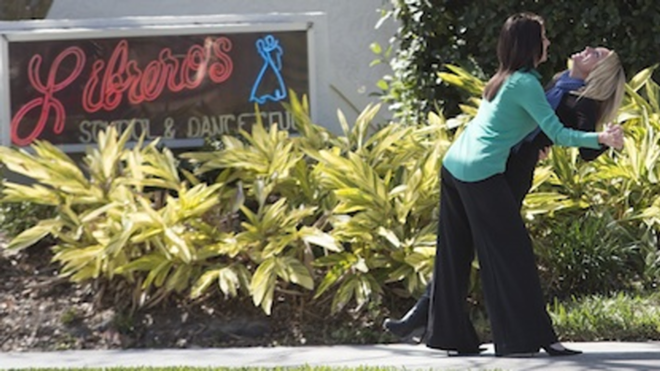
This past Valentine’s Day, Danielle Beckmann found herself in the exciting early stages of a new relationship. She wanted to find the perfect gift for her girlfriend of three months, Megan Younkman, and decided on something that would not only be romantic, but also a unique way to spend time together: dance lessons.
But rather than putting on their dancing shoes, the couple said they instead found themselves facing anti-gay discrimination, which led to Beckmann filing a formal complaint against a local dance studio with the City of Tampa’s Community Affairs Department.
With American TV audiences revved up for rumbas again with the latest season of Dancing with the Stars, the questions raised by Beckmann and Younkman can be applied to ballroom dancing as a whole: Is it a world in which gender discrimination is built in?
Librero’s School & Dance Club has been operating out of its studio on Davis Boulevard since 1979. Beckmann, 27, and Younkman, 36, spend most of their time at Younkman’s apartment on Davis Islands, so Librero’s, which they’ve passed many times, was an obvious choice for Beckmann when she decided on dance lessons as her Valentine’s gift.
She called the studio just before Valentine’s Day and learned it was offering a special dance package for couples — $79 for one group and two private lessons.
But at the last minute, her job (she is an assistant at an ad agency) conflicted with her Valentine’s plans, so she called Librero’s again a week later to see if she could still get the discounted rate.
The special was still available, she was told by a woman who identified herself as Blanche Librero.
Then the conversation took an unexpected turn, according to the complaint Beckmann filed with Community Affairs.
“When I asked Blanche Librero if they gave lessons to same sex couples,” reads the complaint, “she replied: ‘No, we’ve been here for 35 years and our lessons/ballroom is full of heterosexual couples.’”
Instead of a group class and an opportunity to dance together, Librero offered the couple separate, singles lessons, Beckmann said. According to the complaint, Beckmann inquired whether she and Younkman could take the private lessons together instead, since it was intended to be a romantic outing for the pair, and was told there weren’t enough instructors available.
“It was kind of ridiculous,” Beckmann said in an interview. “How many instructors does one couple need? I wouldn’t gather that two people require more instruction than a group of 30 people or an individual.”
Rebecca Crigler, a former instructor who taught at Librero’s between 2003 and 2007, said splitting up a couple is out of the ordinary for the studio. “They wouldn’t separate a couple; they wanted to keep couples together,” she said. “Their market is couples – social dancing couples.”
The couple decided to spend a weekend away together for a belated Valentine’s Day celebration rather than take dance lessons. They enjoyed their trip, but Beckmann was haunted by her experience with Librero’s. “It took some time to sink in, but I was really taken aback,” she said. “I’ve never experienced any kind of discrimination before and I’m a little unhinged by it. … It was a little disheartening.”
On Friday, March 8, she filed a formal complaint with Community Affairs.
Community Affairs handles citywide investigations of discrimination complaints and enforces the city’s Human Rights Ordinance, which guarantees “equal access and the full enjoyment of goods, services, facilities, privileges, advantages, or accommodations of any place of public accommodations” for a variety of protected classes, including the LGBT community. The ordinance excludes establishments and private membership clubs that aren’t open to the public.
“A dance studio would be considered a place of public accommodation,” said Deborah Marshall, an investigator with Community Affairs, prior to the filing of the complaint. “It’s unbelievable things like this go on, but they’re the reason [the city] added that [LGBT] protected class to the ordinance.”
Jake Slater, director of Neighborhood Services, which oversees Community Affairs, couldn’t legally comment on the complaint because it is “an open, active case.” But he did say Librero’s had been sent a copy of the complaint, and the next step would be mediation or investigation.
“Normally, we help mediate between the two parties and try to come to a mutually agreed-upon settlement,” he said. “We try to get both parties together as our first step.”
Prior to the complaint filing, CL spoke to the studio’s owner, Emilio Librero, who said, “We wouldn’t let a woman dance with a woman or a man dance with a man.”
The reason, he said, is because the school tries to cater to their “mostly heterosexual” clientele. “We have an older crowd here, with a different, old-school mindset.”
Blanche Librero wouldn’t comment for the record. But via email, the studio’s attorney, Arnold Levine, responded, “I am satisfied that neither of the Libreros ever said that they do not allow same-sex couples to dance together.” In the studio’s March 19 response to the city re the couple’s complaint, Levine called the allegations of discrimination “absolutely false and untrue” and for that reason the studio “declines to participate in mediation.”
“At no time has Mr. or Mrs. Librero or Librero’s Dance Studio discriminated against any individual because of their race, color, religion, national origin, sex, sexual orientation, gender identity or expression, age, disability, familial status, or marital status,” he wrote in the response, “nor have they discriminated against any person(s) directly or indirectly, or have refused, withheld from or denied to any such person ‘the accommodations, advantages, facilities, or privileges thereof’ provided to citizens by the applicable City of Tampa ordinance.’”
Levine also wrote in the response that Blanche Librero offered to have two male teachers available for individual lessons for the couple because “traditional ballroom teaching involve[s] the teaching by a male of a female or of a female by a male.”
Via e-mail, Levine wrote, “For the past 35 years Librero’s School & Dance Club has followed a policy of partnering people according to their gender (one male with one female) and not according to their relationship. If two people come together to the studio to take traditional ballroom dancing lessons, one a male and one a female, they are put together and taught, whether they are a couple, friends, father and daughter, or mother and son. By the same token, if two females or two males seek dance lessons in traditional ballroom dancing, male teachers would teach each of the females and female teachers would teach each of the males.”
He also said that Librero’s would not fall under the city’s definition of a public accommodation.
But Maritza Betencourt, human rights investigation supervisor for Community Affairs, said that by the city’s definition a dance studio would be considered a public accommodation.
She said the department has consulted with city attorney Allison Singer, who, Betencourt said, didn’t find anything on the books that would indicate a dance studio wouldn’t be considered a public accommodation. Even if a studio claims to be a private membership club, “as long as people pay to have lessons, it’s a public accommodation,” Betencourt added.
Since Librero’s has refused mediation, Betencourt said the next step is a full investigation of the complaint, which includes interviewing all parties involved. The investigation should begin sometime in the next few weeks.
Other studio owners in the Tampa Bay area are surprised that a lesbian couple seeking to take dance lessons together would be denied the opportunity.
“I’m absolutely flabbergasted that a gay couple would be denied lessons somewhere,” said Elizabeth Joy, regional director of Fred Astaire Dance Studios in the Tampa Bay area. “It’s just not fair and nobody should face that kind of discrimination.”
Joy has seen many same-sex couples come to her studios for a variety of reasons, from learning social dances to preparing for their first dance together as a married couple. “We absolutely would never think of denying anyone a lesson,” she said. “We teach all kinds of couples.”
She added, “Ballroom dancing isn’t just senior citizens anymore. As the days go on, it gets younger and younger.”
Julia Meyerovich, owner of 1st Dance Studio in St. Petersburg, said anyone who would deny lessons to a same-sex couple has an “old-fashioned and uptight” mentality. “To each his own,” she said. “We don’t judge here. All lifestyles are welcome. And if anyone says they have a problem with that, then they can leave my studio.”
Meyerovich offers alternative group dance classes for same-sex couples, but says gay students are also welcome at all group classes and events – “wherever they are most comfortable.”
Gulfport Casino, which hosts a variety of dances in various genres, is an extremely open-minded venue for social dancing, said Sam Mahfoud, organizer of Swing Time events on Wednesdays.
“It’s Gulfport. Of course they’re pretty open,” he said. “We get some ladies who dance the lead parts and every once in a while we’ll get a man doing the follow parts.”
While many social dance studios and clubs welcome same-sex couples and LGBT dancers with open arms, competitive ballroom dancing, steeped in tradition, operates on an entirely different plane.
“I think ballroom dancing is one of the last bastions of homophobia we need to defeat,” said Barbara Zoloth, president of the North American Same-Sex Partner Dance Association, a membership organization that promotes social and competitive same-sex partner dancing.
It’s not that LGBT individuals aren’t permitted to dance competitively in mainstream events; it’s just that to do so they are required to dance with partners of the opposite sex.
Various governing bodies in the competitive dance world — such as the National Dance Council of America and World DanceSport Federation — explicitly define a couple as a male and female partnership. Nigel Lythgoe, a judge for Fox’s So You Think You Can Dance?, found himself in hot water in 2009 for a critique he gave a same-sex couple auditioning for the show, and a tweet that followed the audition, in which he said, “The same-sex ballroom guys did remind me of ‘Blades of Glory.’ However, I’m not a fan of ‘Brokeback’ Ballroom.”
And producers of Dancing with the Stars, which has popularized ballroom dance with its televised competitions pitting celebrities against one another on the dance floor, have said they wouldn’t allow same-sex couples to compete.
DWTS, which recently kicked off its 16th season, has considered such pairings in the past. They approached actress Portia de Rossi, wife of Ellen, about competing on the show with a female partner, but she declined the offer. And the show has featured openly gay male contestants (Carson Kressley of Queer Eye for the Straight Guy, former ‘N Sync-er Lance Bass) and a transgender contestant (Chaz Bono) – all partnered with female dancers.
In a 2011 interview with NBC News’ Today.com, producers from the show said that’s where they’ve decided to draw the line.
“[T]he traditional role in ballroom [dancing] is for men to have a female partner, so that’s what we’ll do,” said executive producer Conrad Green.
The Israeli version of Dancing with the Stars, however, had no qualms about including a same-sex duo. In 2010, sports presenter Gili Shem Tov, an out lesbian raising a son with her female partner, competed as one-half of a same-sex pairing.
Some might argue that because of the physicality of the sport, much like figure skating or gymnastics, all-male, all-female, and heterosexual couples would be on unequal footing if competing against one another, each pairing with its own inherent advantages and disadvantages.
But “technique is technique,” Zoloth said. “And all the dances are the same.” So it shouldn’t make a difference if a same-sex couple is competing against a mainstream, heterosexual couple.
The competitive ballroom dance world could be viewed as a microcosm of how homosexuality is regarded throughout America today, Zoloth said. The moderate middle might be OK with someone being gay until that person’s sexuality is actually expressed.
“When people see a couple dancing, they immediately see sex,” said Zoloth, “a vertical expression of horizontal desires. It’s different than if you see a couple talking or even just holding hands.”
While ballroom dance is a competitive sport, it’s also a “very heavily gender-roled sport,” Zoloth said. “And I don’t see things changing anytime soon,” she said.
Stil, while competitive and social ballroom dance are both tied to traditional gender roles, the two follow very different rules and regulations. Competitive dance creates its own statutes regarding who may participate; social dance studios are required to adhere to local laws.
As Beckmann and Younkman await the outcome of the city’s investigation, the couple is reconsidering the whole idea of ballroom dancing.
They were ready to commit to a new pastime, something that would bring them closer together. Now Librero's studio has lost two potential long-term students.
“It could have been a new hobby for us to pick up,” Younkman said. “We were prepared to spend a significant amount of money at that establishment. They’re losing out on business. It’s something we would have done for a very long time together had it been enjoyable.”
Beckmann added, “I just wanted to do something special for her, something we could do together.”
Full disclosure: The reporter’s partner worked as a dance instructor at Librero’s from 2003-2010. She left on good terms to pursue another line of work, but has since returned to dance instruction at a studio in Clearwater. She is not quoted in this article.
















